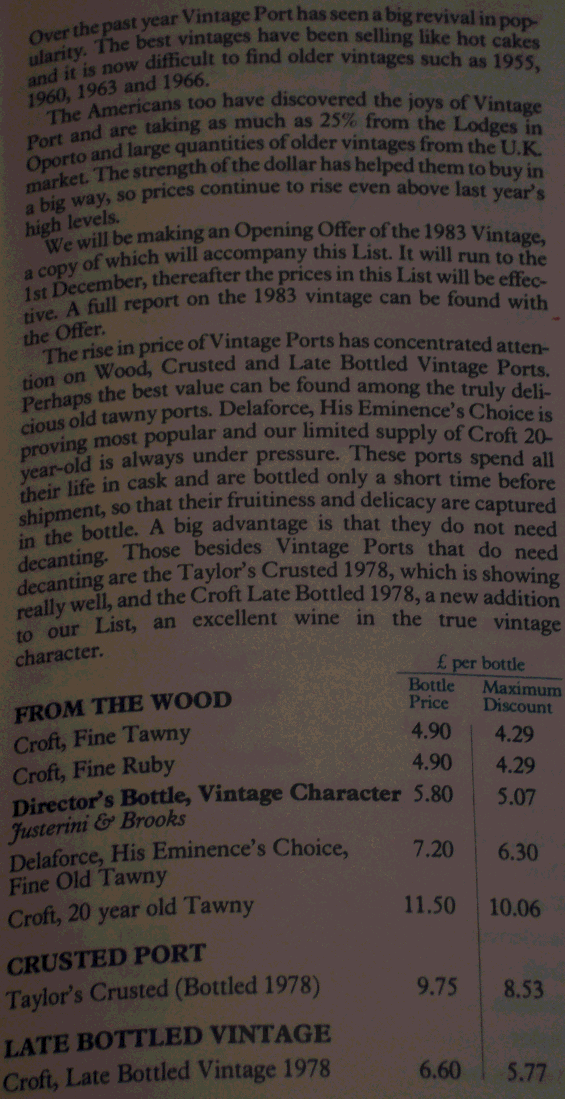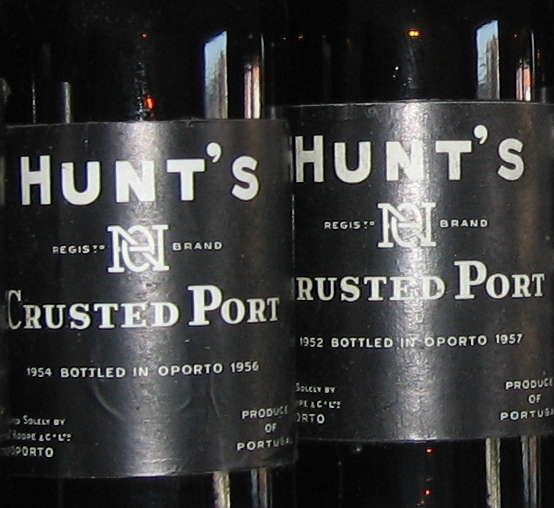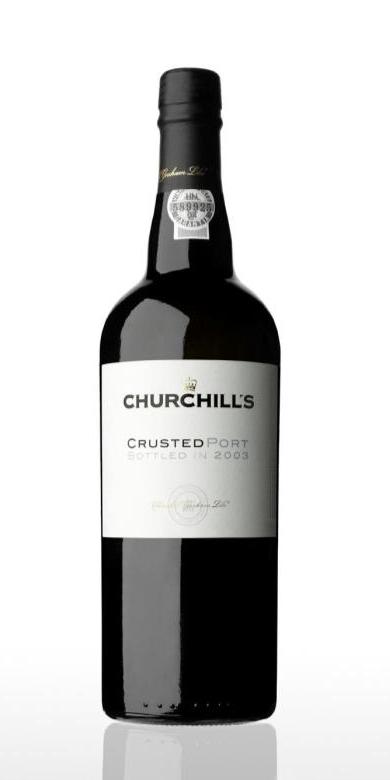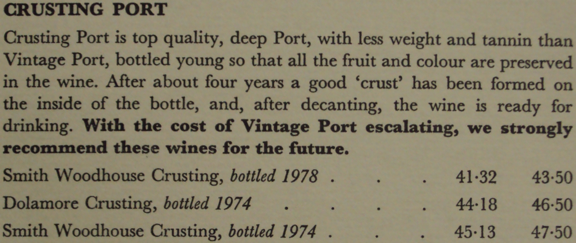Page 3 of 7
Re: Crusted port database
Posted: 23:37 Tue 26 Jan 2010
by jdaw1
Justerini & Brooks, Spring 1985.
 (Already on the list. Lower price is with bulk discount.)
(Already on the list. Lower price is with bulk discount.)
Re: Crusted port database
Posted: 10:22 Wed 27 Jan 2010
by jdaw1
Justerini & Brooks, Autumn 1985.
 (Already on the list.)
(Already on the list.)
Re: Crusted port database
Posted: 13:18 Wed 27 Jan 2010
by jdaw1
Justerini & Brooks, May 1987.
 (Already on the list.)
(Already on the list.)
Re: Crusted port database
Posted: 21:14 Wed 27 Jan 2010
by jdaw1
Justerini & Brooks, Autumn 1988.
 (Already on the list.)
(Already on the list.)
Re: Crusted port database
Posted: 23:08 Wed 27 Jan 2010
by jdaw1
Justerini & Brooks, Autumn 1992.
 (Not yet on the list.)
(Not yet on the list.)
Re: Crusted port database
Posted: 23:43 Wed 27 Jan 2010
by jdaw1
Justerini & Brooks, 1995/96.
 (Already on the list.)
(Already on the list.)
Re: Crusted port database
Posted: 10:26 Fri 29 Jan 2010
by uncle tom
would there be much unhappiness if it were to become a chapter in the book currently (not being) written by DRT and I?
None at all - but a tiny reference to my efforts woud be appreciated!
Tom
Re: Crusted port database
Posted: 16:57 Fri 29 Jan 2010
by jdaw1
uncle tom wrote:reference to my efforts woud be appreciated
Deal.
Re: Crusted port database
Posted: 22:44 Sat 20 Feb 2010
by jdaw1
Justerini & Brooks catalogue produced in 1963 for The Highland Brigade Wine Society

Re: Crusted port database
Posted: 00:22 Tue 23 Mar 2010
by jdaw1
Justerini & Brooks’ purchasing book

Re: Crusted port database
Posted: 23:21 Sun 28 Mar 2010
by jdaw1
In the tasting room of Ferreira, photographed 29 September 2008:

(Terrible kerning.)
Re: Crusted port database
Posted: 23:26 Sun 28 Mar 2010
by uncle tom
Can we assume these are Ferreira wines?
We already have a record of a '52 Ferreira, but bottled a year earlier.
Tom
Re: Crusted port database
Posted: 23:42 Sun 28 Mar 2010
by jdaw1
uncle tom wrote:Can we assume these are Ferreira wines?
I have no information other than the photograph. Generally Hunt Roope ≈ Tuke Holdsworth.
Re: Crusted port database
Posted: 17:41 Thu 01 Apr 2010
by DRT
Hunt, Roope and the Tuke Holdsworth brand were acquired by Ferreira in 1956. These were therefore bottled and sold under Ferreira's ownership but the wines would have been produced by Hunt, Roope. The wine could well be from Quinta da Eira Velha as that was the principle property owned by HR in that period. Pure speculation, of course

Re: Crusted port database
Posted: 11:41 Sun 02 May 2010
by jdaw1
Corney & Barrow order book, March 1891, records sales of ‟Old Crusted Port”. The term was widely used, and I suspect imprecisely defined.
Re: Crusted port database
Posted: 22:19 Tue 03 Aug 2010
by jdaw1
Peter Bedford Limited, Wine & Cigar Merchant, Leamington Spa and Warwick, catalogue of Autumn 1966.

Re: Crusted port database
Posted: 14:23 Wed 15 Sep 2010
by uncle tom
A while back, the UK merchants jumped seamlessly from offering Churchill 2002 to the 2004, leading me to assume that there was no 2003 bottling.
Wrong! Rather bizarrely, a lone merchant in the Czech republic is offering the 2003, complete with photo - so now added to the list.
http://www.portugalmarket.eu/cz/katalog ... usted-port
Nickolls and Perks have acquired a small stash of Taylor '70 crusted (I bought a couple, despite being overpriced..) - so also added.
Tom
Re: Crusted port database
Posted: 16:12 Wed 15 Sep 2010
by jdaw1
So that we don’t lose the image, added.

- Churchill Crusted bottled in 2003
- Ch2003c.jpg (15.75 KiB) Viewed 23049 times
Re: Crusted port database
Posted: 18:45 Wed 15 Sep 2010
by mosesbotbol
jdaw1 wrote:Justerini & Brooks, Spring 1985.
 (Already on the list. Lower price is with bulk discount.)
(Already on the list. Lower price is with bulk discount.)
I had a case of 78 Taylor Crusted. Maybe 5-6 bottles left. Lot's of spearmint, kind of hot. Very sweet.
Re: Crusted port database
Posted: 13:57 Wed 06 Oct 2010
by RAYC
How do the Vale Dona Maria "Lote No. XX" ports fit into the IVDP classifications?
It is billed as an "unfiltered reserve" port, though from the description on the website sounds rather like a crusted.
"From my own vineyard, Quinta do Vale D. Maria, located in the far hills of the Douro, this Port was bottled, unfined and unfiltered, as my personnal reserve. Issued from wines that were vinified foot troden in old granit stone ‟lagares” and aged in old wooden vats, this unfiltered ‟Reserve” is bottled only once every year, on the date shown on the label. The Lote nº indicates the series of the bottling. Lote nº 00 was the first Port of this style of Quinta do Vale D. Maria to be released. It is a blend of different years with the great majority of the wine in the blend being from the harvest of the second year before the bottling date (i.e, bottling in 2002, base wine in the blend from the 2000 harvest). It is bottled unfined and unfiltered in the tradition of the best bottle ageing Ports. This Port shows a great structure with intense fruit character and soft ripe tannins. It is specifically blended to age in bottle for many years to come but it can be thoroughly enjoyed now. Past and future predictable total productions in bottles of 75cl."
http://www.valedonamaria.com/pag15_1.asp
Re: Crusted port database
Posted: 14:50 Wed 06 Oct 2010
by uncle tom
There is no reason why you should not market this as Crusted port, provided that (IIRC..)
- you put the year of bottling on the label.
- it gains IVDP approval as a Crusted port
- it is called Crusted port on the label.
- you cellar it for at least three years after bottling before offering it to the market.
IVDP rules aside, I would be very interested to try some samples of your product, with a view to possibly buying a commercial quantity.
Please send me an email or PM if you are interested in discussing business.
Tom
Re: Crusted port database
Posted: 15:23 Wed 06 Oct 2010
by RAYC
Tom,
I was just quoting from the website in my post - am not anything to do with the quinta myself.
Looks like there is a bottling date on the label, though I've seen that AHB has tried some of their "Lote No.06" (
viewtopic.php?f=2&t=3099&p=27618&hilit=lote#p27618) which suggests that they may be releasing earlier than the 3-year qualification would otherwise permit.

Re: Crusted port database
Posted: 17:47 Wed 06 Oct 2010
by DRT
I seem to recall that this is declassified VP. I can't remember why it had to be declassified but what is in the bottle is unfiltered port from a single vintage bottled after two years. I and a few others from here tasted some of this at the quinta last year and it was very nice juice.
Re: Crusted port database
Posted: 19:07 Wed 06 Oct 2010
by Dom Symington
Very intrersting thread but much of what is being refered to as Crusted or Crusting in the comments and photo's is infact "old fashioned" LBV ... as Andy made clear in his post. These two terms were in quite common use in the wine trade even when I strated (!) and simply refered to wine that had already or were truely capable of developing a crust.
Many of these wines are either "old fashioned" LBV's or "vintage ports" from non-declared years which in part have been replaced by Single Quinta's.
Crusted has never included the vintage (year of vinification) but only the bottling year. If a vintage (year of vinification) is included on the label plus a bottling year it will effectivly be an LBV or non-declared vintage port.
Examples are the Hunt's 54/56 and 52/57 although both labeled as Crusted they are infact a non-decalred vintage and an LBV. (I don't know if Hunt's did or not, actually declare 54, although one would assume not!)
Re: Crusted port database
Posted: 19:33 Wed 06 Oct 2010
by jdaw1
Dom Symington wrote:(I don't know if Hunt's did or not, actually declare 54, although one would assume not!)
There is no evidence that Hunt Roope declared 1954 let’s call that a ‘not’.
Re: Crusted port database
Posted: 20:05 Wed 06 Oct 2010
by SushiNorth
Dom Symington wrote:Crusted has never included the vintage (year of vinification) but only the bottling year. If a vintage (year of vinification) is included on the label plus a bottling year it will effectivly be an LBV or non-declared vintage port.
This would suggest that the real value in all this data is to create a list of non-declared VPs, which in itself might make for an interesting tasting.
Re: Crusted port database
Posted: 20:43 Wed 06 Oct 2010
by jdaw1
Dominic: My understanding, perhaps wrong, is that VP is aged in giant Tonnels for not more than two-ish years. From there it can go directly into bottle, or, ≤1970 vintage, into a much smaller shipper’s pipe for transport to, and subsequent bottling in, the UK. LBV used to be late-in-the-UK, meaning two in Tonnel, more in shipper’s pipe, then into bottle. Was it always true that Crusted/ing never spent more than a couple of years in Tonnel? If so, it really was an LBV. But if Crusted/ing sometimes aged awhile in Tonnels, then, at least up to 1970, it was fundamentally different to LBV.
Re: Crusted port database
Posted: 17:00 Thu 07 Oct 2010
by uncle tom
Dom,
In compiling this database, I have worked on the principle that if the label says Crusted, then Crusted it is. With the older bottles, and catalogue entries, it is often hard to determine if the content is Crusted as we know it today, or an ancestor of LBV or SQVP.
But while we have your attention on the subject, how about bottling a second wine from Vesuvio each year, and marketing that as a Crusted port?
- Just an idea!
Tom
Re: Crusted port database
Posted: 19:11 Thu 07 Oct 2010
by Dom Symington
well that certainly woke everyone up!
Tom, very fair comment although I'm not sure I'll bring up your second point at tomorrow's Board Meeting!
Julian, generally correct although the bottling was very much a question of merchants choice (and conviction in some cases). There was no firm rule as to the age of the blend for Crusted/ing. The difference also one would assume is that ...ed was pre-aged by the wine merchant and that ...ing was sold on bottling for further ageing!
Just back from a day at Vesuvio, Vintage in the last stretch although the weather certainly looks like it may take a turn for the worse ... we still have 5 or so days to go. Fingers crossed!
Re: Crusted port database
Posted: 08:45 Fri 08 Oct 2010
by DRT
Thanks for you recent activity here, Dom - very interesting! (although I am minded to think that part of your motivation is to see what comes next in the ranks after "cheap ruby"

)
Good luck with the last stretch of the harvest.
Given the discussion above I think we need some facts around which to frame the definitions. I will trawl through my books later to see when the various styles were defined. I will then take some mind-bending drugs and read Julian's last post again to attempt to understand what he is trying to say

Re: Crusted port database
Posted: 12:04 Fri 08 Oct 2010
by jdaw1
DRT wrote:and read Julian's last post again to attempt to understand what he is trying to say
At least at the start of LBV, it spent two years in Tonnels, and was then shipped to the UK in shipper’s pipe. So, if a style of port let’s call it Crusted has two years in Tonnel and ages in shipper’s pipe, it’s just like an LBV. But if this mysterious ‘Crusted’ stuff spends ages and ages in Tonnel, then it isn’t like an (early) LBV.
Re: Crusted port database
Posted: 12:57 Fri 08 Oct 2010
by uncle tom
The difference also one would assume is that ...ed was pre-aged by the wine merchant and that ...ing was sold on bottling for further ageing!
This raises the interesting question as to whether Crust
ing port (as Dom defines) could be legally sold today?
Battling through the Portuguese of the IVDP regulations, I can only find reference to the word Crust
ed so presumably Crust
ing is an unregulated term.
And although it rarely appears, there does not seem to be anything to stop a producer putting the bottling date on a Reserve.
So could we have, for example,
'TPF Crusting Port' (writ large on the label)
'Bottled in 2010' (writ only slightly smaller) and then
'A blend of unfiltered fine reserve ports, supplied by Symington family estates...etc' (in small print at the bottom) ?
If booked out as a Reserve, it could presumably be shipped immediately.
- or have I missed something?
Tom
Re: Crusted port database
Posted: 13:15 Fri 08 Oct 2010
by DRT
jdaw1 wrote:DRT wrote:and read Julian's last post again to attempt to understand what he is trying to say
At least at the start of LBV, it spent two years in Tonnels, and was then shipped to the UK in shipper’s pipe. So, if a style of port let’s call it Crusted has two years in Tonnel and ages in shipper’s pipe, it’s just like an LBV. But if this mysterious ‘Crusted’ stuff spends ages and ages in Tonnel, then it isn’t like an (early) LBV.
Ah, so you are attributing the difference to the size of the wooden cask in which the port is aged prior to bottling. I may be wrong but I don't think that is relevant. The thing that would make the difference in "style" (in an official sense) is the length of time in wood, not the size of the cask.
I am sure there are some small producers out there who make their LBV in small vats or pipes simply because they only make small quantities. Some of the big boys might bottle straight from the Tonnel whilst others might give their wines some time in smaller casks to speed-up the evolution process so that their LBV's are ready to drink as soon as they are bottled. None of this would bar them from classifying the wine as LBV.
Am I missing something?
Re: Crusted port database
Posted: 15:51 Fri 08 Oct 2010
by g-man
DRT wrote:jdaw1 wrote:DRT wrote:and read Julian's last post again to attempt to understand what he is trying to say
At least at the start of LBV, it spent two years in Tonnels, and was then shipped to the UK in shipper’s pipe. So, if a style of port let’s call it Crusted has two years in Tonnel and ages in shipper’s pipe, it’s just like an LBV. But if this mysterious ‘Crusted’ stuff spends ages and ages in Tonnel, then it isn’t like an (early) LBV.
Ah, so you are attributing the difference to the size of the wooden cask in which the port is aged prior to bottling. I may be wrong but I don't think that is relevant. The thing that would make the difference in "style" (in an official sense) is the length of time in wood, not the size of the cask.
I am sure there are some small producers out there who make their LBV in small vats or pipes simply because they only make small quantities. Some of the big boys might bottle straight from the Tonnel whilst others might give their wines some time in smaller casks to speed-up the evolution process so that their LBV's are ready to drink as soon as they are bottled. None of this would bar them from classifying the wine as LBV.
Am I missing something?
Are ports stored in neutral or toasted barrels?
the smaller the barrel, the more the toast of the barrel will impart flavors upon the smaller liquid volume no?
I would imagine the surface area of a smaller barrel to liquid ratio of a small barrel is greater then the same ratio on a bigger barrel. Probably giving a more vanilla/oak if barrels were even lightly toasted before bottling.
Re: Crusted port database
Posted: 16:35 Fri 08 Oct 2010
by DRT
g-man wrote:Are ports stored in neutral or toasted barrels?
Neutral.
The difference between large and small casks for port is the speed of oxidation. The larger the cask the slower the oxidation.
Re: Crusted port database
Posted: 17:21 Fri 08 Oct 2010
by g-man
DRT wrote:g-man wrote:Are ports stored in neutral or toasted barrels?
Neutral.
The difference between large and small casks for port is the speed of oxidation. The larger the cask the slower the oxidation.
i wonder if individuals can buy these after aged barrels =)
I've got a 30lb pig I'm looking to smoke!
Re: Crusted port database
Posted: 17:39 Fri 08 Oct 2010
by Dom Symington
Derek, you are partly right ...!
Crusted is now the only permitted version and the wines are certified on bottling, must be cellared for a minimum of 3 years before release and undergo a second certifictaion from the IVDP prior to final release to market.
The "toast" on port barrels is a red-herring, all port is always aged in seasoned tonnels or pipes, never new wood. The only "toast" they get is when being made in the cooperage when water and a brazier are used to bend the staves and is frankly not significant. I can see that on your next visit we'll have to spend some time in the cooperage!
Julian, although broadly right I don't think you should get too fixed on 2 years in tonnels etc... This time scale only came into formal use recently. In the past, the age prior to bottling and shipment was up to each individual, and considering that until the demise of bulk shipments Crusted/Crusting wasn't even recognised by the IVP (at the time with no D!). We used to ship "Crusted" for UK bottling as a Reserve.
In all these permutations the secret is for the blend to have the ability to throw a crust and therefore evolve in bottle. The longer in cask (of any size - faster ageing if smaller/slower if larger) the softer the wine will become irrespective of its ability to throw a crust.
Re: Crusted port database
Posted: 18:51 Fri 08 Oct 2010
by uncle tom
Dom,
Do you think the IVDP would take issue with the use of the word Crusting as part of the brand name for an unfiltered Reserve?
Tom
Re: Crusted port database
Posted: 19:46 Fri 08 Oct 2010
by Dom Symington
Tom. I have absolutely no doubt that they would! We live in an extrodinarily regulated environment which unfortunately has very little imagination or simple marketing experience and believes that restriction is the best solution! ... aka, despite what some of the worthy members of this forum may feel (with due apologies!), Pink was case in example!
Re: Crusted port database
Posted: 21:15 Fri 08 Oct 2010
by uncle tom
Dom,
Thanks - I was actually quite surprised that Pink was allowed, as it seemed to denigrate the product class as a whole; and while some producers have now managed to produce an acceptable Rose port, the earliest samples were truly awful. Although the word offers an alliteration, I still think that 'Pink' is an inappropriate descriptor for a product class that has a hard fought reputation for quality and distinction.
Moving on, I do have a serious interest in procuring products that have an appeal to niche markets. Even if Crusting is too close to Crusted to place it off-limits on the label, I am still interested in routinely buying a quality, unfiltered and ageworthy Reserve that has the year of bottling clearly indicated on the label. Quantities would not be huge, but commerically viable. If you are interested, please ask your marketing guys to contact me privately.
Tom
Re: Crusted port database
Posted: 22:57 Fri 19 Nov 2010
by jdaw1
From the 1966/7 price list of Henekeys and Backs of Norwich

I know that there is no bottling date you can see what I can see.
Re: Crusted port database
Posted: 15:20 Sun 21 Nov 2010
by jdaw1
Winter 1965/1966, from Edwin Giddings Ltd, then of 28 St John Street, Devizes, now of 15 St John Street


Re: Crusted port database
Posted: 15:21 Sun 21 Nov 2010
by jdaw1
Winter 1966/1967, from Edwin Giddings Ltd, then of 28 St John Street, Devizes, now of 15 St John Street

Re: Crusted port database
Posted: 21:11 Sun 21 Nov 2010
by jdaw1
! of which the Graham 1950 and Taylor 1952/56 are not currently in the list.
Re: Crusted port database
Posted: 23:16 Sun 21 Nov 2010
by jdaw1
Dolamore Wine List Summer 1973


Prices are per £ bottle for: six cases; one case; a single bottle.
Re: Crusted port database
Posted: 23:33 Sun 21 Nov 2010
by jdaw1
Dolamore Wine List Autumn 1973

Prices are £ per bottle for: six cases; one case; a single bottle.
Re: Crusted port database
Posted: 23:40 Sun 21 Nov 2010
by jdaw1
Dolamore Wine List Summer 1974

Prices are £ per bottle for: six cases; one case; a single bottle.
Re: Crusted port database
Posted: 23:44 Sun 21 Nov 2010
by jdaw1
Dolamore Wine List Summer 1975

Prices are £ per bottle for: six cases; one case; a single bottle.
Re: Crusted port database
Posted: 23:50 Sun 21 Nov 2010
by jdaw1
Dolamore Abridged Spring List 1977

Prices are £ per case for: ‟12 Cases Assorted”; ‟6 Cases Assorted”; ‟One Case”.
Re: Crusted port database
Posted: 00:02 Mon 22 Nov 2010
by jdaw1
Dolamore Abridged Winter Wine List 1978-79 Wholesale

Prices are £ per case for: ‟7 Cases Assorted”; ‟One Case”.























